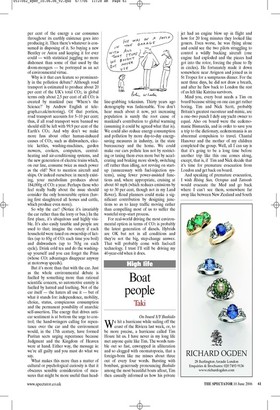Motoring
How to be green
Alan Judd
My 40-year-old Land Rover achieved an indicated 60mph this week. It took over a mile to get there and, given another mile, a heady 63mph or 64mph might have been possible. But I backed off, partly because it sounded as if something was about to burst and partly because of worries about what David Cameron and the Archbishop of Canterbury might think of this wanton act of global pollution.
Resuming the usual comfortable cruising speed of 30–40mph (‘comfortable’ to be understood in the purely technical sense applicable to ancient Land Rovers and tractors), I was content to emit perhaps only five or six times the CO2 that Mr Cameron’s Prius produces. Content because my old Land Rover will actually contribute less to global warming every year than his new Prius.
That’s because it will be used much less. A point frequently overlooked in our selfmortificatory wailings about global warming is that calculations are often of potential emissions based on assumptions of use rather than actual emissions and actual use. It’s the latter that count and they vary hugely according to individual habits. Not that any single car is anyway capable of making any difference at all to any climate anywhere. You need to multiply it by millions to achieve a difference that is even theoretically calculable, let alone measurable.
In fact, there is an argument for sticking with older vehicles rather than buying newer, cleaner ones. An estimated 10–13 per cent of the energy a car consumes throughout its earthly existence goes into producing it. Then there’s whatever is consumed in disposing of it. So buying a new Bentley or Aston and keeping it for ever could — with statistical juggling no more dishonest than some of that used by the doom-mongers — be portrayed as an act of environmental virtue.
Why is it that cars feature so prominently in the pollution debate? Although road transport is estimated to produce about 20 per cent of the UK’s total CO2, in global terms only about 2.5 per cent of all CO2 is created by mankind (see ‘Where’s the Science?’ by Andrew English at telegraph.co.uk/motoring). Of that portion, road transport accounts for 5–10 per cent; thus, if all road transport were banned we should still be left with 99.9 per cent of the Earth’s CO2. And why don’t we make more fuss about other human-induced causes of CO2, such as dishwashers, electric kettles, washing-machines, garden mowers, cookers, computers, centralheating and air-conditioning systems, and the new generation of electric trains which, on our line, consume twice as much power as the old? Not to mention aircraft and ships. Or indeed ourselves: in merely existing, your metabolism produces about 184,000g of CO2 a year. Perhaps those who feel really badly about the issue should consider the only honourable option (having first slaughtered all horses and cattle, which produce even more).
So why the car? (Notice it’s invariably the car rather than the lorry or bus.) In the first place, it’s ubiquitous and highly visible. It’s also easily taxable and people are used to that; imagine the outcry if each household were taxed on ownership of kettles (up to 85g of CO2 each time you boil) and dishwashers (up to 765g on each cycle). Drink cold tea and do the washingup yourself and you can forget the Prius (whose CO2 advantages disappear anyway at motorway speeds).
But it’s more than that with the car. Just as the whole environmental debate is fuelled by something more than rational scientific concern, so automotive enmity is fuelled by hatred and loathing. Not of the car itself — the haters all use it — but of what it stands for: independence, mobility, choice, status, conspicuous consumption and the permanent possibility of anarchic self-assertion. The energy that drives anticar sentiment is at bottom the urge to control; the hand-wringers calling for repentance over the car and the environment would, in the 17th century, have formed Puritan sects urging repentance because Judgment and the Kingdom of Heaven were at hand. Either way, the message is: we’re all guilty and you must do what we say.
What makes this more than a matter of cultural or psychological curiosity is that it obscures sensible consideration of measures that might be more useful than head line-grabbing tokenism. Thirty years ago demography was fashionable. You don’t hear much about it now, yet increasing population is surely the root cause of mankind’s contribution to global warming (assuming it could be agreed what that is). We could also reduce energy consumption and pollution by more day-to-day energysaving measures in industry, in the state bureaucracy and the home. We could make our cars pollute less not by restricting or taxing them even more but by accelerating and braking more slowly, switching off rather than idling, not revving on startup (unnecessary with fuel-injection systems), using fewer power-assisted functions and, where appropriate, cruising at about 60 mph (which reduces emissions by up to 30 per cent, though not in my Land Rover). Road planners could make a significant contribution by designing junctions so as to keep traffic moving rather than compelling most of us to suffer the wasteful stop–start process.
For real-world driving the most environmental option in terms of CO2 is probably the latest generation of diesels. Hybrids are OK but not in all conditions and they’re not the big, step-change answer. That will probably come with fuel-cell technology. I trust I’ll still be driving my 40-year-old when it does.



















































































 Previous page
Previous page